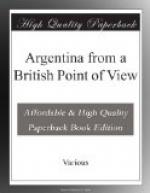The journey for the first forty miles is over the same ground as I have already referred to, in the direction of Lake Titicaca, and there is nothing more to be said about it, beyond that we changed animals at a place called Ocomisto, this being simply a few Indian huts where there is always a supply of grain and water for the animals, and the ordinary country fare for the passing traveller. There was a long journey ahead of us, so we only remained during the time that was occupied in outspanning the tired mules and inspanning the fresh lot. At 1 o’clock we reached Machacamarca, another “tambo” or resting-place, and were very disgusted to find that our pack animals, which we had dispatched the day before, had got no farther than this point. Our desired destination for the night was the Indian town of Achicachi, twelve leagues off, but as it was now quite out of the question to think of travelling our baggage animals so far before night should overtake us, we had to change our plans and therefore directed our coach towards Guarina, another Indian town on the shores of Lake Titicaca, but much nearer than Achicachi, and we eventually arrived there at 5 p.m., having covered, more or less, fifty miles since morning. The journey seemed longer, as the country is so much alike all along the route; but as the roads were fair, travelling was quite comfortable.
Guarina is purely an Indian fishing village, and the only white people are the Bolivian half-caste authorities. As I have already stated, there are no hotels or even lodging-houses in these Indian towns, and ordinary travellers have just to hunt about until they find a place suitable to put beds for the night. However, as my friend was a “personage” in Bolivia, in other words, a man of position and power in political circles, we of course fared considerably better than we should otherwise have done had he not been with us; and we were invited to put up in the house of one of these men in authority. He did his best for us in their frugal way of living, and gave us a meal consisting of “Chairo,” which is soup as black as coal, and made from frozen potatoes which are called “chuno.” These are about the size of walnuts, hard and black, and have to be well soaked before cooking, and then they are not a savoury bite. The next plate consisted of “Chalona,” already described as lean sheep dried in the sun, and which, generally speaking, is very repugnant in appearance, smell, and taste. Never mind, we were hungry and partook of whatever was brought along, until the “inner man” cried content! The meal, I may add, was washed down with a cheap “wine” distilled from cheaper raisins, but it was something wet, and for the time sufficed.




